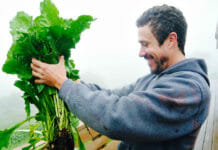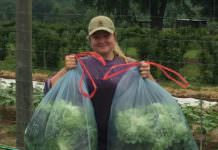It’s time to do your weekly food shopping. Walking into the store, you head first to the produce section. There’s microgreens from Blue Moon Acres, apples from Solebury Orchards and Manoff Market Gardens, squash, corn, tomatoes, greens, root vegetables, onions, garlic – you name it – all from local Bucks County farms. Then it’s onto meats. Ah, pastured pork, lamb, beef, bison and poultry (chicken, turkeys and ducks too!) from farms all over Bucks County. But, look…there’s free-range eggs, cheeses and fresh milk too. Pick up your freshly roasted fair-trade organic coffee, bread and other baked goods. All in one place, almost all organic or natural, and all produced in Bucks County or nearby.
This place doesn’t exist – yet. But if a group of determined Bucks County locavores have their way it will be known as the Doylestown Food Co-op.

So, what is a Co-op? And how is it different from what we have now in Bucks County? Consumer co-operatives (Co-op) have been around in the US since the early 1900s. Based on principles of open membership, democracy, participation and community, they bring together like-minded people for economic and social benefit. In fact the Co-op is owned by its members, who support the business through membership fees, and have a say in what the store carries and how it is run. If you’ve lived in the Delaware Valley, you’ve probably heard of the Weaver’s Way Co-op in Philadelphia, or the Swathmore Food Co-op in Delaware County, both of which have been in business for decades.
Why Doylestown and why now? “We want to bring the local bounty of Bucks County and nearby to our community,” says Lisa White, member of the Doylestown Co-op’s Steering Committee. “It’s about keeping our local farmers and producers here and viable.” White, one of the founding households in the Doylestown Food Club (DFC), knows of what she speaks. For the last year, she has coordinated volunteers in the local food buying club, who drive all over Bucks County, collecting locally produced and raised food, and bringing it back to Doylestown for pick-up by club members on a biweekly basis. The club has grown so fast they’ve had to put a cap on members and have outgrown their borrowed distribution site. That’s part of the impetus in bringing the Co-op into existence. To give a greater number of consumers “one-stop, convenient access to the wide and abundant variety of foods grown and produced,” in Bucks and nearby.
Supporting the local food economy is a central principle of the nascent Co-op, which sets it apart from many other Co-ops around the country. Having a brick-and-mortar location that can offer locally grown organic and natural food will not only sustain local producers, but help “grow” the local foodshed. As the market for locally sourced food grows, so will producers grow, adding variety and bringing products to market that local consumers want.
“Every Co-op is different,” says Marc BrownGold. “It’s a reflection of its community, its character – and an important tenet of cooperatives.” BrownGold knows a thing or two about the Bucks County’s local food scene. After some thirty years in the food business – including stints in Philadelphia with Steve Poses’ restaurants, Executive Chef at Hamilton’s Grill in Lambertville, and his own restaurant and gourmet market in Buckingham, he’s taking his passion for locally sourced food to his new job as the Fresh Foods Manager at the Swathmore Food Co-op.
In Swathmore, BrownGold brings more than his professional cooking knowledge to the job. As he meets with local producers and farmers to bring products to the Co-op, he also brings those relationships and information into the store, effectively bridging the gap between producer and consumer, and creating trust. It’s exactly that kind of trust that brings people to local farmers’ markets, but farmers’ markets aren’t always convenient for everyone. That’s another driving force behind the formation of the Doylestown Co-op. To create another way to access locally produced food that will be more convenient in terms of location and time.
Don’t confuse Co-ops with CSAs however. CSAs, or Community Supported Agriculture farms, require members to pay an upfront fee for a share of that season’s produce. CSA members get an allotment of produce every week or other week. The allotment is comprised of whatever was harvested that week. It’s a great system for eating fresh, local produce and supporting local agriculture. But once again one size does not fit all. Many households want more freedom to choose what, when and how much they buy. The Co-op works differently. Member-owners pay a lifetime membership fee – all at once or over a multi-year period. Once that fee is paid, that’s it. Shopping is done in a brick-and-mortar location, year-round, like any other retail food store.
 Even though it will be member-owned, the Doylestown Food Co-op will be open to the public too. The aim is to put as many local foods on local tables as possible. But in order for the Co-op to open its doors, it will need at least 800 households to pay the full equity investment of $360. That demonstrates to banks and other potential financial backers that there is strong community support for this business venture, as well as providing start-up capital for rent, equipment, utilities and such. If that’s not in your budget, you can pay $100 per year for four years, or work out another option with the Co-op. The Co-op is about community, participation and inclusivity – and that means turning away no one.
Even though it will be member-owned, the Doylestown Food Co-op will be open to the public too. The aim is to put as many local foods on local tables as possible. But in order for the Co-op to open its doors, it will need at least 800 households to pay the full equity investment of $360. That demonstrates to banks and other potential financial backers that there is strong community support for this business venture, as well as providing start-up capital for rent, equipment, utilities and such. If that’s not in your budget, you can pay $100 per year for four years, or work out another option with the Co-op. The Co-op is about community, participation and inclusivity – and that means turning away no one.
A volunteer steering committee comprised of community members has formed over the past year. With the help of the Keystone Development Center, Weaver’s Way Co-op, the Mid-Atlantic Food Co-op Alliance, and the Food Co-op Initiative (formerly Food Co-op 500), this group has written bylaws and a business plan, and finalized a membership structure. Locations, licenses, zoning, financial projections and legal and tax issues are being worked on in subcommittees. Although most Co-ops take more than 3 years to go from vision to bricks-and-mortar, the hope is that it will happen much sooner in Doylestown.
If this sounds like a professional, serious effort, it is. Visit the Co-op’s website for a complete, intelligent explanation of their progress, including a section on frequently-asked-questions that covers what Co-ops are, how membership works, and important local food facts. On the site they summarize their effort eloquently,
Without the stabilizing effect of community food co-ops, local farms all over the country have been tempted or even forced to sell their land. But Bucks County is different. In recent years, through the hard work of local residents, knowledgeable farmers … our local food system has grown. There are new farms, CSA’s, farmers’ markets and other agriculturally based businesses making this an auspicious time to steady and create central access to these resources.”
To learn more about food co-ops visit the websites of the National Co-op Grocers Association, the Swathmore Food Co-op and the Weaver’s Way Co-op.
Join other Bucks County locavores on Thursday, May 12 at the County Theater for the Doylestown Co-operative’s Kick-Off Event. They will provide information about the co-op and show the award-winning documentary, “Food Fight.” The movie will be followed by a Q&A session with a panel of local farmers, future co-op producers, and local food champions. You might also win a raffle basket, filled with locally grown or produced products. Co-op membership sign-up will be available on site, so bring your checkbook! The event begins at 6:30 pm, with the movie starting at 7:00 pm. Tickets are $10 and can be purchased at the theater box office or by mailing a check (by May 1st) to the co-op to PO Box 951, Doylestown, PA 18901.
This article was originally published in the winter 2011 issue of Bucks Life magazine.










![What we’re reading [Oct 16 2017]](https://www.buckscountytaste.com/wp-content/uploads/2017/10/coffee_macbook_reading_pexels-photo-414630-218x150.jpeg)

[…] that evening. For more information about the event and the co-op, see their website and see the article on Bucks County Taste about the […]
Hi,
I work for Sovereign Housing Association and work like to set up a Food- Co-op in Wendover please could you email me the details.
Thanks
Jaz
Hi Jaz,
Try some of the resources on this page to learn more about starting a co-op. Good luck!
http://doylestown.coop/co-op-resources/